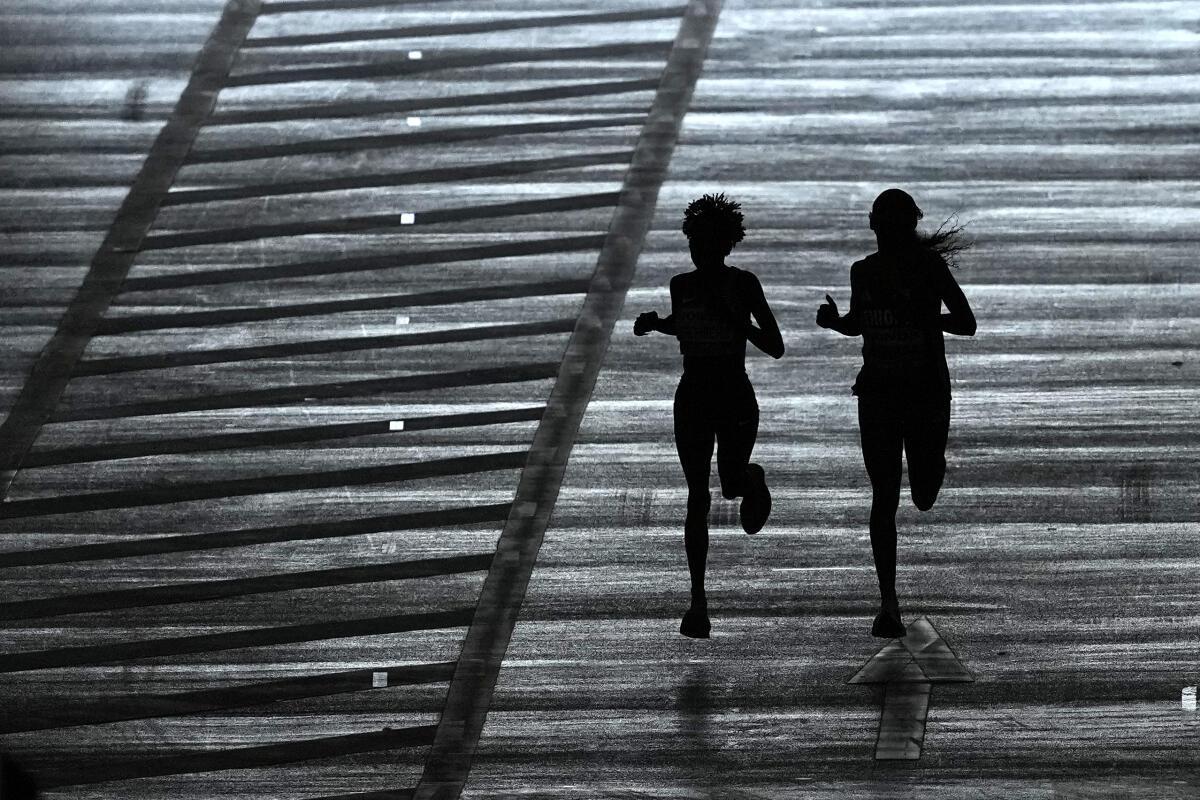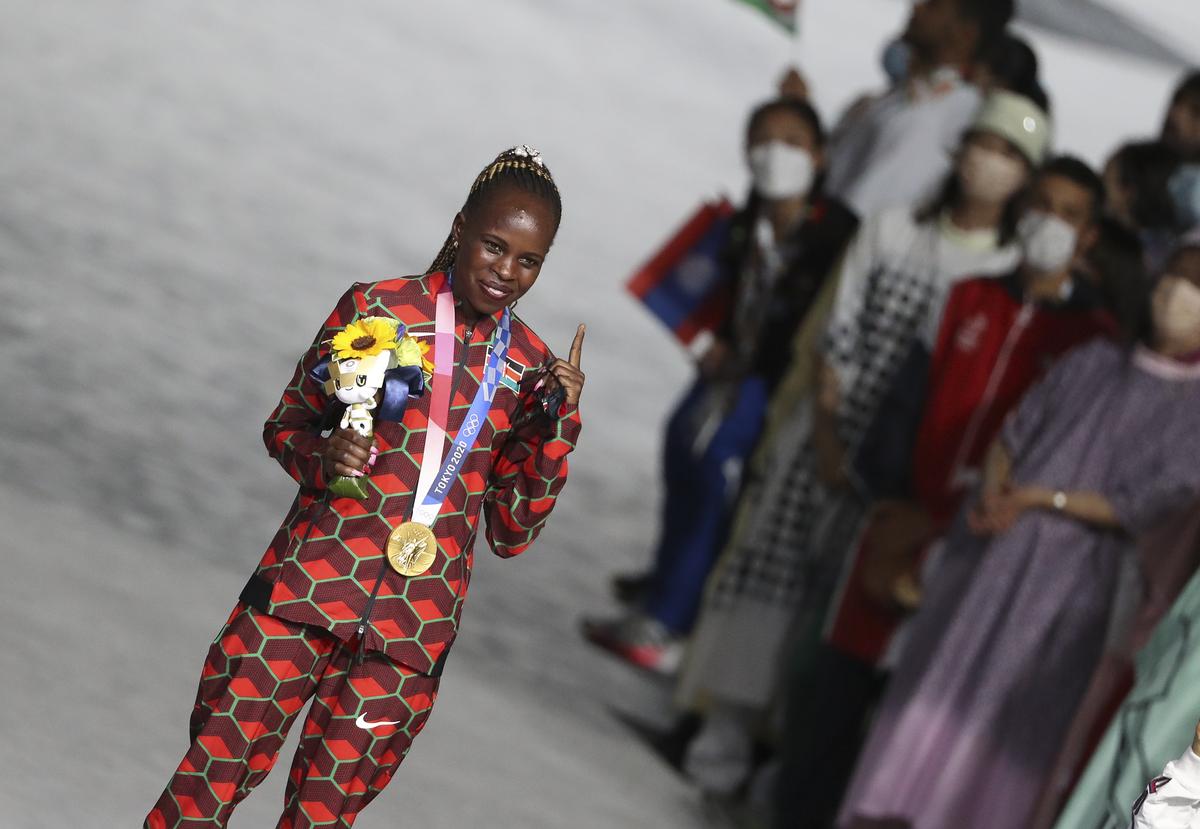April was a difficult month for Peres Jepchirchir.
The Kenyan was forced to withdraw from the London Marathon, weeks before the race, with an ankle injury. She then learnt that Tigst Assefa, silver medallist at the Paris Olympics, had broken the women’s-only world record, which Jepchirchir had owned since the 2024 London Marathon.
Warrior’s mindset
Jepchirchir, however, is that rare elite athlete — one who rarely encounters failure but always bounces back from setbacks in style. She was unbeaten in the marathon from December 2019 to March 2023. Her reign included Olympic gold in Sapporo’s oppressive heat in 2021, a triumph at the famed five-borough New York Marathon months later and a stunning conquest of the Boston Marathon’s challenging hills in 2022. A hip injury derailed her run of momentum, and she subsequently suffered her first-ever defeat in an international marathon in London.
Jepchirchir’s response came in her next marathon. She set the women’s-only mark — no male pace-setters — at last year’s running of the iconic London race, her third World Marathon Major title. She then had to deal with heartbreak at Paris 2024, where she was bidding to become the only woman to defend her marathon gold. This April’s London Marathon was meant to be her riposte. But while her comeback was delayed, it could not be denied.
The 31-year-old arrived in Tokyo, determined to make her maiden World Championships her own. She watched compatriot Beatrice Chebet claim the 10,000m gold and prayed she could create her own moment, too. Then, in stiflingly hot conditions, she was locked in a one-on-one contest with Assefa, the Ethiopian who had taken her record. This was personal.
ALSO READ | Usain Bolt on his track greatness: ‘I wanted to set high standards and I did’
For more than two-thirds of the race, Jepchirchir and Assefa were content to hang back as American Susanna Sullivan charged ahead solo, looking dominant and in control. The tables suddenly turned around 90 minutes in, when Assefa and Jepchirchir pulled ahead to take the lead and commence a war of nerves and stamina.
It was Assefa who looked the more comfortable, as the Kenyan appeared to struggle in the gruelling environment. Still, Jepchirchir managed to match her rival stride for stride. The pair were neck-and-neck coming into the final kilometre. Assefa chanced her arm as she bolted down the back straight in the National Stadium, but Jepchirchir produced a lung-busting final 100m sprint, ending the epic tussle in dramatic, breathless fashion.

Shaking off a shadow: Jepchirchir and Tigst Assefa were locked in an epic tussle in Tokyo, which the Kenyan ended with a lung-busting sprint.
| Photo Credit:
AP
The Kenyan broke the tape at two hours, 24 minutes, and 43 seconds, just two seconds ahead of Assefa, for her first world title. “It was devastating to pull out of London earlier on in the year. I had picked up an ankle injury in training and the doctors advised me to take a total rest of two months to avoid complicating it further and maybe making it a stress fracture. I just listened to them and then returned to train for the Worlds,” Jepchirchir told TelecomAsia.
“I honestly didn’t expect to win, but I am really delighted. The weather was also not very conducive, it was so hot, so difficult, but I put in my best and also was motivated by Beatrice Chebet’s victory on day one and I wanted to add a gold for Kenya.”
A kick for the ages
Jepchirchir was especially pleased with the final moments. She is known for her knack of winning tight races. Tokyo’s denouement only added to her reputation. “When I entered the stadium, I got a lot of energy from the fans. It was not my ultimate plan to sprint in the final metres, but when I saw I was 100m from the finish, I just started to kick. I found some hidden energy there.
“This is my first Championships and I feel grateful that it happened in Tokyo because I won my first marathon gold medal in Japan at the Olympics. This one was tougher. The humidity was so high and I did not know it would be so hot. I still have a long way to go. I will work extra hard. This makes me believe [in] myself more and more.”
Self-belief has shaped and underpinned Jepchirchir’s life. Born on a remote Kenyan farm in Kosaji, Turbo, she dropped out of school because her family could not afford the fees. Running was a way out of the financial difficulties. “Life was not easy,” she said in an interview with Kenyan outlet KTN. “We are 24 siblings and that is why I decided to work hard because we had minimal resources at home. Small-scale farming was the only source of income to our family.”
After competing in road races and cross country, making a name at the national level, she announced herself on the global stage with gold at the 2016 World Half Marathon Championships in Cardiff, the first of three world titles over that distance. Jepchirchir experienced a life-changing moment in 2017, when she became a mother. She says motherhood has made a better athlete, expanding what she thought were her limits.
ALSO READ | When opportunity meets preparation, big leaps follow: long jumper M. Sreeshankar
“It has changed my life since Natalia was born,” she told Olympics.com. “Having a baby motivated me. You have to work extra hard because now you know you have someone depending on you. It wasn’t easy. Losing weight was a tall order. It was also difficult to sleep. Sometimes I would wake up to change early to go for training, then she also wakes up…so I’d stay and breastfeed first. You just have to commit yourself, love it and enjoy it.”

Capital gains: Jepchirchir has enjoyed her biggest triumphs in Tokyo, having also won Olympic gold in the Japanese capital city.
| Photo Credit:
Getty Images
Incredibly, Jepchirchir charts her journey without a coach — another indication of her belief in herself, not to mention a secure, independent mind. It’s remarkable, given that the women’s marathon, with Assefa and Olympic champion Sifan Hassan, is full of top competitors.
Embracing autonomy
“I’m the one who feels my own body, I don’t have a coach. I train by myself. I used to make my own programmes and keep my records,” she told Sports Wave Africa Foundation. “I used to follow the records for the previous years and previous races so that I can compare. That would let me know if I’m in good shape or not. I run when I feel like and I prefer to do things my own way. I train alone for now and I plan to continue like that.”
Jepchirchir’s husband now helps organise her training programme, in pen and paper. While her immediate schedule is undecided, the 31-year-old has long-term goals of continued dominance. Returning home to a hero’s welcome after the World Championships, Jepchirchir said, “I was under a lot of pressure. Ethiopia had selected a strong team, and Assefa is the lady who broke my women-only record. My aim now is to break that record back. It means a lot to me — after injuries and coming back to win a world title — it motivates me to aim higher.”

